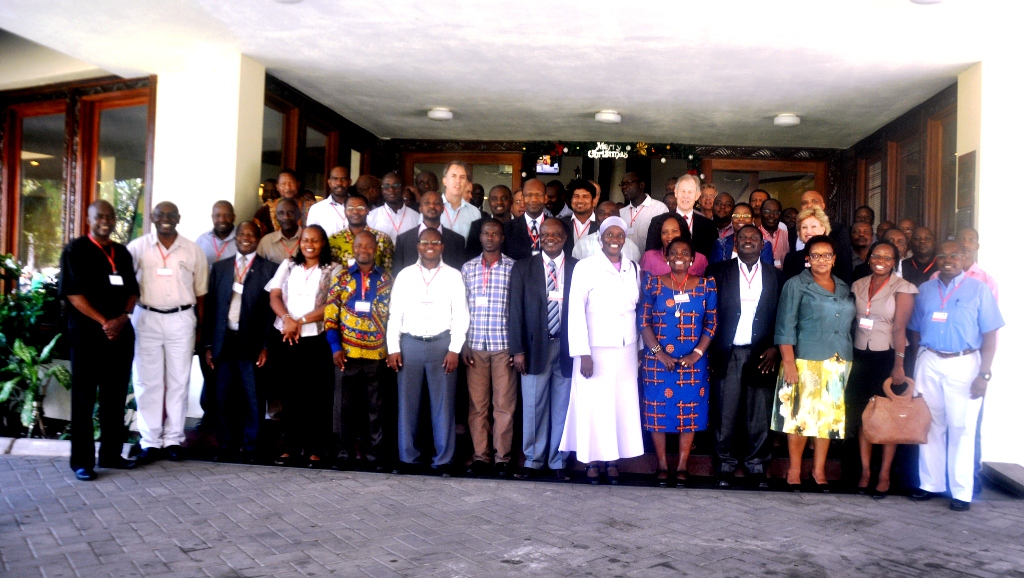Stakeholders in the agricultural sector in Tanzania support the move by CGIAR to integrate the activities of the different centers and research programs (CRPs) and to better align with the country’s priorities in developing its agriculture sector.
The stakeholders agreed on this at a national consultation workshop on CGIAR “site integration” that was held in Dar es Salaam, Tanzania on 4 December 2015 organized by IITA on behalf of CGIAR and CRPs working in the country. The aim was to discuss how CGIAR/CRPs can work better together and align their activities and research agenda to the country’s priorities. This was the second such workshop organized by IITA for CGIAR; the first one was held in Abuja, Nigeria, in November 2015.
The participants were drawn from the different ministries, national agricultural research systems (NARS), universities, NGOs, donor community, private sector, and farmers’ groups.
The Permanent Secretary in the Ministry of Agriculture, Food Security and Cooperatives, Sophia Kaduma, said that integration across the different CRPs and with a wide range of national partners and stakeholders in the agricultural sector can enhance the outcomes of CGIAR’s research agenda.
She noted the potential of the agriculture sector in Tanzania’s efforts to reduce poverty and achieve its developmental goals of shifting to a middle-income economy by 2025, and reiterated the role of research and development to improve agriculture and combat climate change and her government’s commitment to R&D.
Representatives from the donor community including the Bill & Melinda Gates Foundation, Irish Aid, USAID, and the World Bank also support the move, which is expected to lead to more efficient use of donor funding and reduction of duplication of efforts.
“Integration” and “alignment” were viewed as important in ensuring that development projects focused on the country’s priorities and not the donors/centers’ whims.
Representatives from the farming communities and the private sector were also at the forum and highlighted some of the challenges they faced. “Farming has to be profitable. As farmers, we face many issues including poor extension services. The extension staff are few, without resources. We are therefore unable to access new technologies from research. Therefore the integration should look at how to support extension to reach farmers,” said Omary Mwaimu from AMSHA Institute.
Participants at the event identified areas where CGIAR/CRP support was needed:
- Dissemination and adoption of new technologies from research.
- Business and enterprise development to enable farmers to make money from farming.
- Capacity building of local researchers especially in areas such as biotechnology.
- Value addition and management of postharvest losses.
- Productivity improvement with focus on climate change – one of the major challenges facing smallholder farmers who need support in terms of what crops to grow in the face of climate change.
- Sustainable intensification of smallholder systems to increase agricultural production and productivity on the same land size but at the same time taking care of their natural resources.
At the end of the workshop, participants came up with a framework for site integration that could help identify the issues and sites as well as suggestions on how to govern and implement the integration, how to monitor and evaluate impact and communicate both within the partners in the integration framework and with external audiences and partners.
For site integration to work, participants agreed that adequate resources should go into its implementation, and to ensure that all the partners are able see the benefit of being part of the integrated approach.


3 Comments
Fai K. Mwaka
June 10, 2016 at 12:01 pmthanks for sharing this useful information
Munyole
June 22, 2016 at 9:27 amEmpowering women to economic liberation is critical in reducing poverty across the world. Thank you for the big work you are doing among the women.
Fredrick Owino
June 22, 2016 at 11:29 amThis one form of Climate Smart Agriculture geared to increase community livelihood